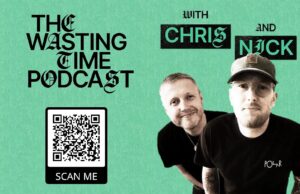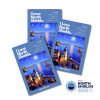North Shields musician AJ Potter’s journey is one of profound transformation, marked by a courageous battle with alcoholism and the deep sorrow of losing his brother to suicide. Yet, from these depths, a powerful artistic resurgence has emerged, culminating in his debut album, ‘The Coin,’ and a new chapter of sobriety.
I had recently seen him play live at The Loading Bay as support for the magnificent Bugman. His set was a thrilling one and he dazzled the audience with his consummate musicianship. At that point, I knew little about him and was keen to get to know more about his musical journey.
AJ’s struggle with alcohol began early, as he reflects, “I started to notice it when I was about 17.” Music, initially a passion, became intertwined with his drinking. “The reason I played music then was for nothing other than drinking,” he admits, “I’d put all my money back into the tills. I wasn’t as passionate as I should have been back then.” The lure of alcohol became his primary focus, “I think that when alcohol got a grip on me, I thought about nothing else.”
The devastating loss of his brother to suicide in 2012 at a young age added another layer to his struggles. “He was 2 years older than me. He would have been turning 21,” AJ recalls. He also notes the wider impact: “It was just at the beginning of a suicide crisis as well. There were other lads that had done it, that I knew.” This profound grief, coupled with his ongoing alcoholism, saw him reach a perilous point. “I was at rock bottom,” he explains, describing himself as “sitting at home alone, listening to records, drinking and taking drugs…..that was my life by this point. A friend of mine told me only recently that he’d seen me on the Fish Quay trying to eat a basket of flowers and I offered him some because I thought I was eating a kebab. I don’t remember it but I have no doubt that it’s true.”
The turning point arrived unexpectedly through a bold decision to contact North East musician Martin Stephenson. “My Grandad and my Uncle are fans of Martin Stephenson, and he started popping up all over my news feeds and I thought, you know what, I’m going to message this guy and ask if I could open up for him one night,” AJ explains. Stephenson’s response led to an invitation to go to Scotland and record some of AJ’s songs. “I sent him some of my songs and he invited me to go and open up for him at one of his gigs. Then he also offered for me to go to Scotland where he lives in the Highlands and record an album. It was meant to be an EP at first.”
It was there that his debut album, ‘The Coin’ was written and produced. Described as a kind of ‘folk rock skiffle,’ his songs are deeply rooted in his personal experiences, using a storytelling approach to bring his world to life for the listener. The lyrical inspiration is drawn directly from his lived reality, encompassing his role as a father, relationships, childhood, personal battles with addiction, his work on building sites, heartache, and love. This unfiltered approach is central to his creative process.
The album’s focus on raw, personal storytelling is more than a simple theme; it is the core artistic philosophy that defines the work. It positions the album as a folk-driven lyrical narrative rather than a pure genre exercise. The value of the album lies not in its potential for mass-market appeal but in its intimate, authentic connection with the listener.
But what unfolded in the Scottish Highlands was more than just a recording session. “I was hung over,” Potter confesses about his arrival. However, Stephenson became a mentor. “It turned out that Martin abstains from alcohol,” Potter recounts, “He taught me all about sobriety over the weekend.” This experience became a catalyst for change. “I had 3 days sober whilst I was up there,” he says, attributing his ability to cope to being “distracted by music and nature and the talk of sobriety.” Stephenson became a “massive inspiration.”
Upon returning home, AJ made a conscious decision to stop drinking. After a brief farewell to alcohol, he ran the Great North Run, where he had a final relapse. “I think that it was the 8th of September, was the Great North Run and then the 9th of September, I just never touched a drop again since,” he states. This significant date marks the beginning of his sobriety, now nearly a year strong. “But it’s just 1 day at a time, I still don’t know what tomorrow holds but I feel like I’ve been given a second chance,” he affirms.
When I ask AJ about his musical inspirations, he attributes his artistic development to several key influences. Sister Suzy, a top-class performer and vocalist, taught him many rock and roll tips and inspired him from their early days in the Little Rock Diner. He also highlights Bugman’s prolific and unreal writing, along with his powerful stage presence. Martin Stephenson’s work in helping artists find themselves is hugely appreciated by AJ, who calls his songwriting phenomenal and him the real deal, noting that he always leaves Stephenson’s gigs filled with pure joy. The Hilltop Hoolies he describes as an absolutely fantastic slice of Americana and all-around good lads. Finally, The Often Herd are praised as a “superb bit of Americana” with some of the best musicians he has ever seen live, particularly noting their stunning harmonies.
Now, with nearly a year of sobriety behind him and a renewed creative spirit, AJ Potter and his band, The NE Rails—named after their rehearsal space at Station East in Gateshead—are poised for their second album. “I’ve got some unfinished business I need to deal with. Me and the band are ready for a second album, you know, we’ve got enough songs there,” he shares, with anticipation of recording by the end of the year. He is very proud of the full band – a six-piece – that he has managed to get together in the last year and which he says ‘just fell into place’; in addition to AJ, there’s Ant on percussion, James on bass, Mellowz Demoz (a long time friend) on keys, Mick on mandolin and lead guitar and Darren on lead guitar.
His extraordinary journey, which he describes as both an “explosion” of creativity and a profoundly “healing” experience, serves as a powerful and inspiring testament to his resilience. From the crucible of his deepest personal struggles and challenges, a truly authentic and vibrant artistic voice has not only emerged but flourished, brimming with an undeniable sense of hope and optimism for the future.














